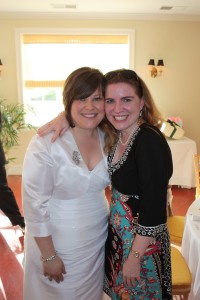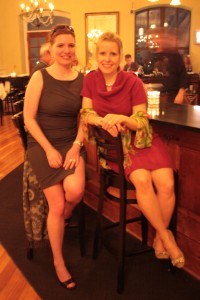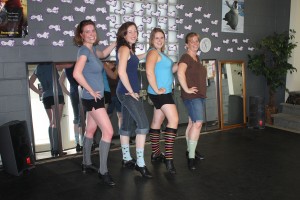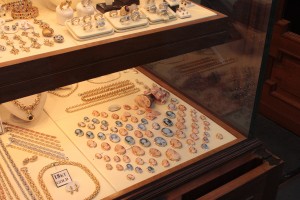Posted by Deborah Huso on Jan 23, 2017 in
Girlfriends,
Musings,
Relationships “An acquaintance merely enjoys your company, a fair-weather companion flatters when all is well, a true friend has your best interests at heart and the pluck to tell you what you need to hear.”
–E.A. Bucchaineri
Sometimes we think by the time we reach our 30s and 40s, we have this friendship business all figured out. Gone are the high school cliques, the drama queens, the users and manipulators…or so we think.
Alas, not all of us who grow into physical adults become emotional adults. And rest assured, emotional maturity is not easily come by, particularly if one is raised, as I was, by adults who had not themselves achieved it.
Who has not faced the raging school mother who faults us for bringing store-bought cookies to the bake sale? Or the friend who cannot be inconvenienced with visiting us but is happy to have us visit her? Or perhaps the eternal borrower of all our things who never seems to get around to bringing them back?
A few weeks ago, when an acquaintance of mine was commenting half bitterly on such a friend, I advised him such friends might be better off dismissed. “She doesn’t seem like a true friend to me,” I remarked.
My acquaintance looked at my quizzically and said, “True friend? I’m not even sure what that means….”
Well, I’m here to set the record straight with wisdom borne out of that painful teacher–experience. How do you recognize true friendship? Here are 15 rock solid clues:
- You can speak your mind to her without fear. In other words, you can be exactly who you are and say exactly what you think, and she’s neither going to cut and run nor judge you, even if you happen to have voted for Donald Trump.
- She will tell you the truth, even when she knows it won’t be easy and it might not feel good…for either of you. She’s not going to lead you down a rosy path that isn’t real. If everyone who loves you thinks you need to stop treating the symptoms of your marriage with martinis, she will speak up and pour the vodka down the drain.
- He loves you through everything. Did you get fired from your job? Did you cheat on your spouse? Did you lie to your wife? It’s okay. He knows you’re human, and he’s going to stand by you even when you’re stupid and wrong. Plenty of convicted murderers have mothers who love them. You deserve to be loved through your faults, too.
- He does not exploit your weaknesses; he protects them. One of the greatest downfalls of marriages and other emotionally intimate relationships is exploitation—when the very people you believe love you most repeatedly throw your vulnerabilities and your faults in your face. They use their intimate knowledge of who you are to win arguments, save face, and break you down. Trust me, if he’s persistently bringing up the fact that you’ve been married four times or that even your mother doesn’t like you, he’s not your friend…. He’s using your trauma to make himself feel better.
- She experiences pride and joy in your accomplishments and happiness and is generous with her praise. If your emotional intimates aren’t your biggest cheerleaders in life, then you need to do some housecleaning. A true friend takes you out to dinner when you get that promotion, cries tears of joy at your wedding when you marry the man of your dreams, and reminds you on a regular basis just how amazing and beautiful you are. After you’ve spent an afternoon in her company, your sense of self-worth should be soaring, not limping.
- She does not compete with you. Instead of advising you, you have one boob that’s higher than the other or deliberately ignoring you at the bar while trying to command the attention of every remotely eligible man in the room while you decide to go back to your room and read a book, she acknowledges your own unique human beauty and longs to bask in its sunshine. Is she proud to be your friend and admires rather than feels threatened by you? If the answer is “no,” ditch her.
- He supports your dreams. No naysayers allowed. If he doesn’t think your mobile Cajun kitchen idea is grand and isn’t sending you advertisements for food trucks, he’s not invested in you the way he should be. True friends want to see you live your dreams and will push you to realize them.
- He encourages you to be your best self. If your main form of entertainment with him is drinking and smoking, reconsider the alliance. We all have our moments when a shot of whiskey seems like a viable treatment for a bad day, but if he is concocting more Manhattans for you than loving encouragement, it may be time to find a new compatriot. A real friend wants to help you on your journey of being the best person you can be.
- She actively works on being her own best self. Stop pitying and enabling the naysayers and do-nothings. Your intimates should be people who not only build you up but who are investing in their own lives. Surround yourself with those who are actively and hopefully working on themselves and not burying their sorrows (and their lives) in self-pity and rage.
- She is unabashedly herself before you as you are before her. She does not pretend to have her shit together with you, even if the rest of the world thinks she’s rock solid. She dares to be vulnerable, fallible, and real. And in so doing, she gives you the space to do the same.
- He forgives. So you criticized his wife. You judged his parenting style. You lost your temper and screamed at him for no valid reason. He decides you’ve had a rough day, a rough week, maybe even a rough year, and lets it go. Because he loves you. And knows you’re grand…even when you don’t know it.
- He says “I’m sorry.” And not the kind of “I’m sorry you feel bad” but the “I’m sorry I did what I did.” He is strong enough to own his error and apologize for it rather than putting the blame on you. A true friend knows when he needs to eat crow and is brave enough to dive in with knife and fork.
- She will go out of her way for you. I once had a “friend” who told me if I moved outside of town, she would never visit me because it was too far. Beware those who will expend no sacrifice on your behalf. The friend who hasn’t the time to drive to your country home is the friend who also hasn’t the time to visit you in the hospital when you have cancer.
- She endeavors to speak your love language even if it is not her own. So she speaks and receives love best through touch—hugs, a hand grasped in times of sorrow, a kiss on the cheek for greeting. But you speak and receive love through service. She recognizes it and dares to venture out of her comfort zone to give to you in the way you best receive….
- He loves with his whole heart and nurtures you in times of suffering. A true friend loves fearlessly and gives relentlessly when you need it most. He will cradle you in care when you are at your worst. Instead of asking, “What can I do to help,” he will determine what needs doing and do it. He will take charge when you cannot. He will give when you need receiving.
Posted by Deborah Huso on Feb 28, 2016 in
Girlfriends,
Musings,
Travel Archives “Beauty is truth, truth beauty. That is all ye know on earth, and all ye need to know.”
–John Keats, “Ode on a Grecian Urn”

Who doesn’t look hot sporting an oxygen tank and a buoyancy control device?
They are among the most recognizable lines in English literature—taught in every twelfth grade English class, recited with little cognizance by millions of students, and something of a mystery even to scholars. Just what did John Keats mean?
And lest you think this blog has devolved into the realm of the esoteric, let me remark that it was just days ago I started to really get these lines supposedly spoken by Keats’ Grecian urn: “Beauty is truth, truth beauty.”
It hit me when I was gazing at the cover of Sports Illustrated’s latest swimsuit issue with so-called “plus size” model Ashley Graham crawling toward the camera in an alluring pose on the beach. When Cheryl Tiegs tweeted that Graham was a poor role model because of her weight, public outrage (at Tiegs) was instantaneous.
As it should have been.
Because beauty isn’t just in the eye of the beholder; it’s also a lot deeper and more complicated than a dress size…or even a pretty face. Like truth, it’s multi-faceted, complex, open to interpretation, and rarely absolute. And it’s also way more than skin deep.
But I can say all these things until I’m blue in the face, and it won’t keep the vast majority of American women (and girls, too) from looking at themselves in the mirror and launching into a litany of self- criticism:
My nose is too big.
My breasts are too small.
My hips are too wide.
My feet are too big.
I’m too short.
I’m too tall.
I look fat.
I hate my muffin top.
Ugh, look at that back fat.
I need to go on a diet.
And on and on it goes. I’ll admit it. I’ve done it, too. After all, in the 40 years I’ve been alive, the ideal woman, physically speaking, has been tall and waif-like (except for the breasts—the breasts remain Barbie-doll size; and I’m talking Barbie from the 1980s, not the C-cup version of modern times). In short, she has been, well, freakish.

Now here’s my idea of a cover shot; the chunky gals in the back are Galapagos sea lions….
But I have, like most other women, nevertheless longed, at times, to exist a little closer to that ideal, even though I was, fortunately, raised by parents who never put a lot of stock in popular notions of beauty. In fact, I don’t think they could have cared less what I looked like. I was raised to place value in intelligence, hard work, good character, and, thanks to my dreamer father, risk-taking and adventure-seeking.
This is not to say I have been immune to the desire to look tantalizingly beautiful. Heck, I admit it, I put on mascara and lipstick to go to the gym. Nevermind that I’m wearing yoga pants and a tank top. I am determined to put myself a step above the Walmart variety woman running around in her flannel PJ bottoms and crocks with socks that don’t match. (Though there is something in me that admires her “fuck it, I just came here to get Doritoes and a box of wine” attitude….)
I do take a little pride in the fact that I stop at lipstick when it comes to gym and grocery store runs. There’s a limit to the absurdity of obsession with appearance in which I will engage. I know women who will do their 20-minute makeup routine before starting a workout that’s going to sweat it all off within 10 minutes. I also know women who primp in front of the mirror, trying on one outfit after another, redoing their hair half a dozen times, wasting precious hours of their lives in an effort to be stunning every single day, physically stunning at least.
And these are not women who have nothing else to offer the world. They are wildly intelligent, witty, successful, worldly. Why the hell are they standing in front of a mirror in Rome fussing with their flat iron instead of just putting a hat over the bad hair day and exploring the perhaps once-in-a-lifetime world on the streets outside?
I think it’s because they don’t really understand what beauty is. Someone somewhere has taught them to define themselves by their face, their breasts, the curve of their hips, the shape of their legs in three-inch heels. Meanwhile I’m lying on a beach with stinky sea lions in the Galapagos or squeezing my body into the most unflattering wetsuit ever and turning my feet into fins. (If you want to test the depth of your self-confidence, put on a snorkel mask and stuff a regulator in your mouth, and let someone take a picture of you.)
A gentleman I dated recently asked me why I was so committed to exercise. “Do you have a goal you’re trying to reach?” he asked. I’m sure he expected me to say something like I wanted to lose 15 pounds, or I wanted to be able to bench press a sofa. But I replied, not the least bit tongue in cheek, “I exercise because I don’t want to deprive myself of wine and cheese and because I still want to be able to hike the Grand Canyon when I’m 80.”
Beauty is truth.
Do you get it yet?
If you’re running five miles at 5 a.m. every morning, and your sole motivation is that you believe in the depths of your soul that your ass is the size of a picnic table, then it’s time for a reality check. If you’re running at 5 a.m. every morning, I don’t care what size your ass is, you’re awesome. You’re strong. You’re motivated. You’re beautiful.

In Puerto Rico with the next generation of beautiful women.
Rest assured, this wasn’t something that came to me overnight. I’ve spent plenty of time lamenting the fact that my eyes aren’t as lovely as Elizabeth Taylor’s or that my rear isn’t as shapely as J-Lo’s. But chances are good, I won’t be lamenting it while teaching my daughter how to ride a bike, while kayaking on a glacial lake, or while sharing cocktails with my best girlfriends on a Friday night.
I find my beauty in strength, courage, and aliveness.
Where do you find yours?
Because if you can’t wipe off the eye shadow and the lipstick, pull off the flattering cocktail dress, the beautiful heels, let down that perfect hair, and stand in front of your bedroom mirror in all the nakedness of your body and soul and feel beautiful, then it’s time to start being kinder to yourself.
No one’s asking you to crawl on a beach in a bikini while photographers take pictures of you and plaster them all over the covers of magazines. In fact, no one’s asking you to do anything…other than be you.
And it’s in that critical truth—your own naked authenticity—that you’ll find your beauty.
Posted by Deborah Huso on Jan 3, 2015 in
Girlfriends,
Men,
Relationships Society teaches us that guilt trips are the purview of women. I’d like to suggest, however, that there is no gender specificity when it comes to guilt. And while I grew up seeing a lot of guilt exercised by women who felt “powerless,” I must say that my more recent life experience shows a good deal more emotional blackmailing by men than women.
Is this a sea change? Perhaps. Perhaps given the fact I tend to associate with professionally and financially successful females, I see a lot more “powerless” feeling men–men who, because their partners and lovers don’t need them as breadwinners and protectors, worry about being ultimately insignificant.
The result, I think, is a strange reversal where women who wish to exercise independence from male partners find themselves in the crosshairs of guilt trips that would even make the proverbial “Jewish mother” blush.
I have enough cases in point to fill a self-help book.
One evening, a girlfriend who had joined me for a night out, advised me her husband would make her “pay for this.” “It’s totally worth it though!” she exclaimed, reveling in a few hours’ freedom from the burdens of marriage and motherhood.
This is not the first time I’ve heard such proclamations. How many times have I watched female friends “watch the clock” on lunch and shopping outings, worried their husbands would give them the third degree later for enjoying themselves outside the family unit?
And these are not pathetic, submissive, and dependent women. They are women who have chosen to be with their male partners out of love, not necessity.
Nevermind that their husbands gleefully go on weekend hunting trips, spend hours watching football with the guys, or spend evenings alone absorbed by their computer screens. For women, this kind of “independent of partner” behavior still remains unconscionable.
And honestly, I don’t get it.
For all the failings in my own marriage, one thing where my ex-husband and I excelled as partners was in giving each other space to be ourselves and experience life outside the confines of “the relationship.” I never chastised him for weekends spent racing anymore than he begrudged me my wanderlust gene that led me to travel to distant places, often without him, exercising my passion for new experiences.
I am not alone in this experience, though sometimes I feel nearly so. I have a girlfriend whose husband has actually thanked me for taking her on “girlfriend getaways” because he says it so lightens her spirit at home when she returns. But this kind of thing is rare.
Plenty of men complain about the resentment they feel from the women in their lives—their spouses’ lack of interest in sex with them, their lovers’ increasing disinterest in spending time with them. As a friend of mine pointed out recently to male colleagues complaining because they’d not had sex with their wives in more than six months but then proclaiming themselves to be such superb lovers, “If you were good in bed, you wouldn’t be having this problem!”
And it’s simple but true.
No one wants to be hen-pecked, male or female. No one wants to be persistently criticized and put down. No one wants to be guilted instead of romantically seduced into sex. No one wants to be made to feel guilty for wanting more than the family unit provides. This is true regardless of gender. And there are few quicker ways to kill romance than to nag, criticize, and guilt trip.
We first fall in love because another human being sees the beauty inside us, remarks on it, tries to access it, grow it. Love drifts into nothingness when that interest turns to jealous gatekeeping, where we think we can protect our turf by making the beloved feel like less than he or she really is.
I’ve seen it many times, in my own life and in the lives of others.
It is perhaps why, when an older gentleman remarked to me one evening at a restaurant I frequent with my daughter, “I’ve watched the two of you interact. You are so loving with her. It is a beautiful thing to behold.”
His comment literally knocked the air right out of me. No man had ever said anything like that to me. All I’ve ever known from men is criticism of my failings as a mother, and this has not been reserved to my ex-husband, mind you. Even the handful of men I’ve dated seriously enough to introduce them to my daughter have remarked repeatedly on my so-called failings.
Meanwhile the women in my life repeatedly cheer me on, empathize with the difficulties of being a parent while balancing a demanding career as well. Is it any wonder I seek their consolation first when faced with the trials of life?
Is it any wonder so many of the women I love do the same? Going to girlfriends, mothers, and sisters—sources of support and understanding who will gently remind them they are incredible mothers, amazing professionals, grand organizers of life’s mayhem.
And yet so many husbands and lovers begrudge their retreat into the arms of this network of unconditional love, somehow failing to realize that if they could acknowledge these women in their lives as beautiful, dedicated, smart, and nurturing and feed them the easy romance of seeing and speaking these things, no guilt trips would be necessary. Wives would come home without dread. They would love without duty but with true longing. They would return to that sacred place they once occupied before the men in their lives became hopelessly scared of losing them.
Posted by Deborah Huso on Oct 20, 2014 in
Girlfriends,
Mothers and Daughters I can’t say as I’ve ever really had the idea that Charlottesville is safe. When I was a child and my mom was attending evening classes at the University of Virginia, Dad always drove her to class and picked her up again. Neither of them believed walking around Charlottesville at night was safe then. And it’s not safe now. The recent abduction and likely murder of Hannah Graham is a case in point.
Charlottesville isn’t a big city, but it’s still a city with a transient university population that can easily attract predators.
Which is why it pays to be a little street smart.
I hope if any of you have adolescent and college-age daughters, you are having conversations with them about responsibility—responsibility for yourself and for others. Graham’s case leads me to wonder if parents are failing (because it’s an uncomfortable subject) to say to their kids, “Look, if you’re going to get drunk, at least don’t do it in the company of strangers. There really aren’t that many people you can trust when you’re under the influence of controlled substances. Know who your friends are.”
I remember being on the Downtown Mall once with a large group of female “friends.” They had asked me out following a devastating break-up of mine that had ended a four-year relationship. After dinner at a restaurant a block from the Mall, we all walked to The Whiskey Barrel for drinks.
I was feeling like crud and not very sociable. I wanted out of this scene.
I told one of my friends I really wasn’t up for socializing and was going to leave. I’d ridden with a group of friends and did not have my car. She basically said okay, and that was it. No offer of a ride, no offer to walk me out to catch a cab.
I wasn’t drunk. But I was distraught and pretty careless of my own welfare that night when the world seemed like it was going to end. Fortunately, a real friend called me on my cell phone, asked how I was, and when I told him what was up, he said, “Okay, get yourself a cab right now, and come to my house where it’s safe.” He’s been my friend since I was a kid…for obvious reasons.
Thank goodness for good friends who look out for us when we don’t have our wits about us.
Where were Hannah Graham’s friends that night? Maybe the people she was with weren’t really those kind of friends.
Real friends look out for one another, and they certainly don’t abandon one of their number who is in a weakened state, in this case, probably not sober.
Learning who your real friends are is one of the hardest lessons of life, and most of us don’t really start getting it until we’re well into adulthood when we have that core group that has stood the test of time, maybe decades, and has rescued us when we could not rescue ourselves.
Friends like that could have saved Hannah Graham.
Friends like that have probably saved me countless times.
Do you know who your friends are?
More importantly, do you know who your daughter’s are?
Posted by Deborah Huso on Oct 13, 2014 in
Girlfriends,
Relationships Originally published March 10, 2012.

Sarah and me, friends since birth
Sarah and I have been best friends on and off again for nearly four decades. So closely did we grow up together, our mothers trading back and forth sleepovers and marching band pick-ups, that we are perhaps as close as sisters, closer perhaps. When life separated us for several years and we fell out of touch, it was that sisterly, almost clairvoyant love that drew us back together again.
I had suffered a devastating break-up. Sarah e-mailed me the day after the split. Only, we had not been in touch for around five years. To this day, we both believe she had somehow, across time and space, sensed my need of her. And our lives have been thus for years, one of us walking in just as the other is about to break.
This is no ordinary connection. That is not to say, however, that it is uncommon. Women, at least those among us brave enough to love fully, have an uncanny ability, so it would seem, for knowing just when to circle the wagons.
I have not always benefited from this love. Raised to be independent and distrusting of others, I was always reluctant as a girl and as a young woman to lead myself into vulnerability, particularly the vulnerability that comes of the deeply connected relationships that women often share.
It is no small surprise to me that men resist this kind of all-encompassing love. Some think it is smothering. And it can be. Women learn, over time, not to call on too many friends at once in times of crisis, or they will be overwhelmed with attention. How many nights have I found myself fielding phone calls and texts from half a dozen concerned females all at once after announcing to them some recent family tragedy? Even worse though is when, in recognition of this, I share a crisis with only one or two to be chastised later by the others for not letting them in to offer succor.

Susannah and me: friends and troublemakers
Circling the wagons is something of a professional calling for us, and it transcends the intimate relationships of tried and true friends, those who have followed us through high school and college, through marriage and divorce, childbirth and death of parents.
I belong to a community dance troupe made up of girls and women ranging in age from six to 60. Every week we engage in what we refer to as “group therapy”—a couple of hours of pulse-pounding dance accompanied by excessive tom-foolery. This is where we (the adult women anyway) let go, beyond the eyes of spouses who may know nothing of this side of us—the practical jokes, the tongue-in-cheek commentary on marriage, sex, and child raising, the posturing in front of dance studio mirrors, the banter over who has the curviest figure, the thickest thighs, the most perfect hair. We are so wild at times that new members to the group often aren’t quite sure what to make of us at first, but we convert them eventually to this gathering of “footloose” women. Here we are girls again, more than girls…because most of us were never confident enough, brave enough to be so ridiculous and fun when we were younger.
But this is also a space of deep camaraderie. When one among us lost a foster child back to her biological mother, we circled her with embraces, then turned her tears to laughter. When we prep for performances, mothers and daughters gather to braid each other’s hair, mend dance shoes with duct tape, and coax one another out of nervousness. Here we find the space to be members of a family where expectations are much lower, where we all recognize the staggering responsibilities of work, marriage, and motherhood, and give one another leave to be silly, irresponsible, and mindless…if only for an hour or two.

My dancing friends on “weird sock day”
I do not know what I would do without these women…any of them…from my most intimate friends to the women with whom I dance each week. They fill my life with laughter, and they prop me up when I am too worn down to stand.
They have been there for me when my family has not been. And they have done all this unconditionally.
Sometimes I lie awake at night wondering why, what it is I have done to deserve the love and kindness of all these women, feeling the powerful blessing of knowing there is this invisible circle of support around me always.
When I feel I have erred foolishly in this life, I turn to my old college friend, Susannah, from whom I know I will always get a refreshingly honest and straightforward assessment of the situation…in addition to ice cream or cheesecake. Yet when I fail to take her sound advice and find myself in a fix, I never fear abandonment. “Friends are not the people who are there only when you do things right,” she tells me on a regular basis.

Retail therapy in Venice with Dorothy
Yet I often wonder how many of us know this, how many of us are brave enough to test the true depth of our friendships, to be who we are without fear among the people we love. It is no easy thing. We are all guilty of holding back, playing games, pretending all is well…even among those closest to us, fearful of the depth and vulnerability we might discover should we let go…and fearful, too, of finding nothing, no depth, no connection, no unconditional love.
Humans are social creatures, and abandonment is one of our greatest primal fears.
It is one reason we are so lucky to be women. It is easy for us to look at men and their easy friendships with other men, their perception of “depth” as an intense conversation about politics, and their ability to compartmentalize pain and fear and envy them. And it is so easy for us to be angry with them, too, for failing to connect with us as our women friends do.
A friend of mine said to me recently, “I cannot help being angry with my husband because he does not know me as well as my best friend does.”
This is not so much a failing in the guy. It’s a failing in expectation. He does not know how, most likely, to know that woman as her best friend does. It is outside his comfort zone to go so deep, as it is with most men. They don’t live in a world of women the way we do. They cannot count on their male friends to protect their weaknesses, honor their strengths, and be there for them no matter the errors they make. It is not the way men are socialized, and it is why they need us so much more than we need them. For most men, it is their wives who serve as their only emotional centers, the only place where they can freely be themselves.
Imagine having only one person who offers you safety. Imagine having none.

New partners in crime in Savannah
I made a new friend recently, as I often do on travels, and as we walked back to our lodgings one evening, discovering, after only a couple of days’ acquaintance that we had much in common, including a similar painful life experience, she said to me with a laugh, “Can I marry you?”
I understood the message behind the joke. Because it took me a long time to stop looking to romantic partners to provide the kind of emotional depth and support that female friends do. I will not over-generalize and say that men cannot provide it. But it is rare to find such a man. As a rule, they retreat into their caves when hurting, confused, or troubled; whereas, women sound the alarm, ask for aid, and let the wagons circle. And when those wagons lock around us in times of trouble, there is no getting through until the danger has passed, chased away by the arrows of shared and recognized grief and the awareness that, with friends, just about anything is survivable.
Originally published March 2, 2012

Coral, gold, and gemstone on Ponte Vecchio
Last Saturday I promised my four-year-old daughter movie and pizza night if she behaved herself all day while I caught up on work in the office. I don’t know as I would go so far as to call my daughter “girly.” She hates baby dolls, loves cars, trucks, trains and LEGOs and is especially fond of getting as dirty as possible when outdoors, but she also has a fondness for all things Barbie and princess. I’m okay with Barbie, and I’m actually okay with princesses, too, as long as we’re just talking about dressing up in a fabulous gown and looking beautiful for the day.
But there is a point at which my tolerance runs a little thin. Heidi persistently asks for Disney princess or Barbie princess movies–you know the ones where the girl finds her “one true love” and lives “happily ever after.” And much though I’d like to pretend my efforts to make her strong, independent, and choosy are overriding all this falderal, I know they’re not.
I still try though and resisted Heidi’s begging for yet another Barbie princess movie last weekend and chose instead the movie Enchanted. You may have seen it. It’s a little bit of an anti-fairytale with the otherworldly princess rejecting Prince Charming in favor of an imperfect marriage to a New York divorce lawyer. It still has the flavor of happily ever after, but it’s a slightly better twisting of reality.
Heidi loved it, and she even got it when the princess fought the dragon instead of the divorce lawyer. But still, it wasn’t perfect. Because the princess fails, and both she and her lover are saved by a chipmunk. Women are still not allowed to save themselves in fairytales.
A friend of mind calls Disney princess “mind-fuck for girls.” I think that’s an apt description.
Rare is the woman, no matter how intelligent, who does not suffer to some degree from a childhood of fairytale mind-fucking. I always thought it had bypassed me. Instead of browsing through catalogs at pictures of stunning wedding gowns as a pre-adolescent girl, I was cutting out pictures of my dream house…which I did eventually build, by the way. It seemed to me, even when I was quite young, that I had a much better chance of building the perfect house than of finding the perfect man.
You can control the construction of a house. Love is something else entirely. It runs where it wants to without asking anyone’s permission in advance. And most men are not prepared to be Prince Charming. They didn’t grow up watching princess movies. So there’s an emotional disconnect between boys and girls right from the get-go. My preschooler recognizes it already. She told me in the car one day, “Boys are stupid, Mommy.” I nodded, for there was much truth in this statement. And then she continued, “Daddy is a boy, so Daddy must be stupid.”
I laughed aloud, as I often do when profundity on a grand scale comes out of Heidi’s mouth. One of my girlfriends told me Heidi is far more advanced than we ever were as girls if she already gets the idea that guys don’t get us.
Even though my parents raised me not too put too much credence in fairytales and to make my own way in the world without relying on anyone else to make it for me, they apparently did not protect me enough. Because I still grew up believing that maybe, just maybe, I would fall in love with my best friend and live happily ever after.

A better view than the jewelry: on the Ponte Vecchio in Florence
It didn’t happen. Not for lack of trying. I think, like so many women (especially young ones), I did my best to cram romantic partners into my personal visions of Prince Charming. And the poor men could not help but fail. My former husband had no idea I actually wanted to be proposed to at the lovely overlook where we first watched the sunset on Skyline Drive. I honestly don’t remember exactly anymore how he asked, it was so unmemorable. Others were worse. Like the boyfriend who foolishly told me he’d bought me a diamond just out of the blue with no indication beforehand that marriage was even on the table. I told him he better pay off his college loans and credit card debt before he dared show me the thing. Thank heaven for that caveat. We broke up long before he had his finances in order, and I was saved from what probably would have been a disastrous marriage.
So I don’t have a romantic proposal story about being carried off on a white horse into the sunset to pass onto my daughter. But then my mother didn’t have one to pass onto me either. She got her engagement ring in the mail. (My dad was in the Air Force in Texas at the time.)
And maybe these anti-fairytales are better anyway. For what pain women suffer in believing that a man will sweep them off their feet one day and love and cherish them forever after. I’m not saying it doesn’t happen, mind you. But it’s rare. In my 36 years, I’ve encountered only one such couple. They were in their 50s when I met them, working at a museum where I had a part-time job during grad school. They’d been married 30 years. Every day at the end of work, that man would come into the gift shop where his wife worked, scoop her up off her feet, and kiss her. And she would giggle like a young bride. It was amazing to watch. Everyone in that museum shop would turn to look, no matter how many times we had seen it. And we all longed to be so lucky.
Because a lot of it is luck in the end, isn’t it? Chances are Mr. Right is out there for you. But chances are he lives on the other side of the country or maybe halfway across the world. He may not even speak the same language as you. How do you find him? That man whose personality is so magnetic that you’ll forgive him a thousand times for failing to put his socks in the hamper or for failing to pick the kids up on time? (Because you know the reason you’re really mad at your husband about his sloppiness and forgetfulness is because you’re mad at him for not being Prince Charming, right?) He’s not your match, and both of you know it, so you spar over the kids’ grades, whose turn it is to do the grocery shopping, why his mother is coming over again, and what to do on the weekend that everyone will enjoy.
Most of us settle for Mr. Half-Right. Or maybe even Mr. One-Quarter-Right because we know that our chances of finding the true Mr. Right are very slim. And someone told us somewhere, likely in a fairytale, that we have to get married, have kids, and pretend to live happily ever after with our “one true love.”
I’d like to think I’m over it. Sometimes I think I am. I’m a realist at least 85 percent of the time. I know men and women often don’t speak the same language, that they have wholly different expectations, that neither gender can be expected to read the other’s mind. I know that 90 percent of the time when a man hurts me, frustrates me, makes me crazy, he really has no idea he’s doing it.
But then something will inspire me to start believing in fairytales again…or at least make me want to believe. It happened most recently last November when Dorothy and I were in Florence, Italy, walking the famous Ponte Vecchio. In case you don’t know, it’s a famous bridge spanning the Fiume Arno that is lined with shops selling gold and silver jewelry. I’ve never been much into jewelry. Once when my former spouse suggested he should update my engagement ring, get me something with a bigger diamond, I told him if he had that much money, I would be far happier with a fantastic vacation or a piece of land. (I never got the diamond, by the way, or a vacation, or a new piece of real estate.) But something about this romantic 1345 bridge in Florence, overlooking the river, with its shops of jewelry and the couples hand-in-hand walking across it gave me a little regretful thrill.
“Wouldn’t it be grand to get proposed to on this bridge?” I suddenly said to Dorothy. “And then go into one of these shops and pick out your ring?”
Dorothy, like me, is something of a cynic about love, but even she had to agree. Yes, that would indeed be fantastic. And so we stood there a moment in between all the glistening shops, looking out over the water and the city, daydreaming about something that was long gone for both of us. And I think we felt a little foolish that we even had such a girlish daydream—two business-owning women who had paid for their own trips to Italy and gone unaccompanied by husbands or lovers.
The “mind-fuck for girls,” as my friend called it, apparently outlasts education, prosperity, experience, even divorce. Which really leads me to wonder what it’s all about, why we can’t let go. Is it something like the “Hope” of Pandora’s Box? Does the idea that the “one true love” is out there somewhere keep us trudging onward in the most hopeless of circumstances, enduring the string of dates with men who are not “the one,” sifting through them all, wondering, and wondering if Prince Charming is ever going to show up? Do we really go through all of this thinking we’re going to be the rare and lucky woman who truly lands Mr. Right??
Maybe.
I know there have been times in my life when I have wanted to shout like Charlotte in Sex and the City, “I’m 35! Where is he?!”
I remember watching a friend of mine walk down the aisle a few years ago. And if anyone had been through the relationship ringer, she was it. I remembered her lamenting during her days as a single, dating woman, “I’m exhausted by it. I am exhausted by dating men, none of whom are right. I just want to give up.” But one day, years later, she walked down the aisle arm-in-arm with the man she believed to be “the one,” and the beaming smile on her face gave me hope for a moment.
Maybe this will be it, I thought. Maybe she really found him, and they’re going to be in love forever. She’ll prove it’s possible. I even told her so. “Make me believe,” I urged her.
But that’s not how it happened. Her husband is not picking her up into his arms at the end of every workday and planting an “oh, my god, I am so in love with you” kiss on her lips. The question is though: does he need to be?
And I’m afraid the answer might actually be “yes.”
But do I say that because I’ve been mind-fucked, too?
Probably.
But I do know two women who found love in their 60s…finally. And at least one of them is quite madly in love. I think of her sometimes when I start feeling hopeless. I remind myself there is always that five percent or less chance that something magical might indeed cross my path one day.
Crazier things have happened.
It never crossed my mind, for example, when I was the child of hard-working parents just barely getting by at times that I would one day enjoy the luxury of standing on the Ponte Vecchio looking at diamonds and coral pendants and perhaps, more importantly, looking across the centuries-old architecture of the city where Michelangelo and Leonardo da Vinci once lived.
I bought a ring for myself that day. It was not a diamond. It was not even expensive. I bought it from the jeweler on the bridge with only a few dozen pieces in his window. He told me he was able to sell the same pieces as his neighbors so much cheaper because of his low overhead. I slipped it on my finger, pulled my leather gloves back over my hands, and proceeded on my way to the Galleria degli Ufizzi to look at the original paintings of Botticelli, Raphael, and El Greco, something I also would never have imagined being able to do on a typical writer’s salary.
It did not occur to me until later that I had done my best to live out my fairytale thus far. And perhaps that simple gold filigree band was something of a self-engagement ring for me, not on the scale of the famous right-hand diamond. My fairytale is not quite that big, not yet. And I suspect if it ever gets that big, I’ll be buying more land with mountain vistas or maybe checking out Antarctica, not frittering money away on diamonds. Who knows? That is the beauty of it, too. The not knowing what’s around the next bend.
In the tale of Pandora’s box, humanity is saved by hope. But hope is not sitting on a windowsill wishing for Prince Charming to come dashing around the corner. Hope is active. It is work. It is believing…and doing…and being…even when the evidence suggests that the game will not end as you would like. It’s still worth a bold attempt. Don’t leave it to princes and chipmunks to save you. That’s great if one comes along and gives you a lift. But try lifting yourself first.
Posted by Deborah Huso on Apr 6, 2014 in
Girlfriends,
Travel Archives  The first night of our journey on the “Fun” Ship we met our tablemates in the Main Dining Room. I’ll call them Mutt and Jeff. (Actually, I think one of them really was named “Mutt.” ) Anyway, Mutt and Jeff hailed from western Kentucky and were on this cruise as an anniversary present from their children. On the surface, they seemed like an ordinary couple in their mid-60s, both feeling, as they admitted, a bit out of place amidst all this “luxury.”
The first night of our journey on the “Fun” Ship we met our tablemates in the Main Dining Room. I’ll call them Mutt and Jeff. (Actually, I think one of them really was named “Mutt.” ) Anyway, Mutt and Jeff hailed from western Kentucky and were on this cruise as an anniversary present from their children. On the surface, they seemed like an ordinary couple in their mid-60s, both feeling, as they admitted, a bit out of place amidst all this “luxury.”
We did our best to be sociable, even after they told us about the “coloreds” in their neck of the woods, and wondered later how seating arrangements on these cruise ships were arranged. It obviously wasn’t by age and interest. But Mutt and Jeff were equally concerned about us. When I mentioned “my husband and daughter,” you could almost hear their sighs of relief. Thank God, we weren’t a lesbian couple after all!
Of course, Mutt then had to ask about Sarah’s marital arrangements, and Sarah replied she was not married. “Well, how old are you?” asked Mutt.
To which Sarah honestly replied she was 33. “Oh, well, I’m sure you’ll find someone one day, dear,” Mutt added with great sympathy.
I think that was the point at which my very happily unwed friend decided she no longer wished to engage Mutt and Jeff in conversation.
It was just as well. We had our waiter to amuse us with tales of all the muggings and murders that occur in Nassau, Bahamas, our next port of call. We were sufficiently warned that winning a lot of money at the casino at Atlantis would make us particularly susceptible to being knifed in the back.
No matter. Sarah had already been to Atlantis on a previous trip, and I was more interested in seeing the local color of Nassau.

Hey, where’s the manor?
We bypassed the cruise ship’s overpriced excursions and planned a day of touring the city on our own, by bus and on foot. And if you take no other advice from me with regard to touring the Caribbean, take this–bypass the taxis that are lined up right outside the cruise ship terminals. Aside from being overpriced, they will isolate you from the culture you hopefully want to experience. Yes, the islands of the Caribbean, in reality, are not the paradises the travel brochures make them out to be. Aside from the resort areas (like Atlantis), they are, for the most part, hopelessly dirty, weather- beaten, rundown, and rife with poverty.
But if you’re reading this blog, you’re probably not the Atlantis type anyway. Sarah and I hitched a ride on a local bus with the aim of first visiting Ardastra Gardens and its flock of reputedly trained pink flamingoes. Riding a bus around Nassau is an experience in itself. This is not your usual city bus. Nope, for the small fee of $1, you have the privilege of riding around in an oversized van with fold-up seats that require you to stand up, fold up your seat, and practically sit in another passenger’s lap in order to let others on and off. The buses are popular with the locals and always full. It’s an experience that won’t disappoint, especially when a local missing a couple of front teeth asks in lilting Bahamian English, “So you girls want to get drunk?”
There’s not actually a bus stop at Ardastra Gardens, so we got off the bus (Bus 10A is the one you want to take) as close as we could to the place and walked along broken-up sidewalks strewn with garbage to this sad little tropical garden a few blocks from Arawak Cay. While the books I’ve read make Ardastra sound like a delightful place, it really isn’t. But then delight is not the attraction here–the flamingoes are.

Lory parrot in for a landing
Garden paths will take you through unkempt tropical undergrowth and alongside the cages and habitats of mournful little monkeys, meerkats, endangered Bahamian parrots, and giant tortoises. None of the animals look particularly happy to be here, though they are perhaps better off here than outside the gates. The one exception are the Lory parrots who enjoy daily feedings by zoo visitors. Be careful if you engage in this activity, however, as the parrots will get into feathered fights on your hand, arm, or head over a succulent piece of fruit.
Sarah and I had read about the flock of marching pink flamingoes and were anxious to see what this was all about. We gathered with other curious visitors at the appointed hour and were treated to what we have since declared the highlight of our trip. There’s nothing particularly organized about this group of “marching” flamingoes, but there is something decidedly humorous in watching their trainer attempt to establish order among flocks of feathered fuschia chaos. You’ll have to watch the video to see what I mean: https://www.youtube.com/watch?feature=player_embedded&v=q0LLPUrtX0U
Posted by Deborah Huso on Apr 1, 2014 in
Girlfriends,
Travel Archives Originally published May 23, 2009.

Our “Fun” Ship
Last fall my childhood best friend and I decided to take a vacation together. Though we’ve known each other pretty much since we were born (in the same hospital one day apart), we had never ever made time for a “girlfriend getaway.” I’m almost ashamed to admit, in retrospect, the cruise was my idea. I had taken a short cruise once before with my husband and found it to be a reasonably acceptable experience, though I have to admit one “at sea” day is about as much as I can handle. I don’t care what the television ads say, being stuck in the middle of the ocean with 2,000 people you’ve never seen before just isn’t that fun, no matter how many Bahama Mamas you drink.
But wait–this was a Carnival cruise. You know the tag line: The Fun Ship.
Well, my dear friend Sarah and I really had no idea what we were in for, though perhaps we should have taken the kilted guys playing bagpipes outside our hotel the night prior to embarkation as a sign. This was going to be a very unusual vacation.
It all started out decently enough. We had reserved an ocean view balcony suite and, hence, earned ourselves the right to priority, escorted check-in. But one cramped suite later, we discovered the meaning of the term “partially obstructed view.” From our miniscule balcony that we could almost fit a chair on with room for our legs, we had a marvelous view of…a lifeboat. Yep, a lifeboat. Well, at least in the event of an emergency, we were covered. All I had to do was swing one leg out of bed and into the lifeboat….no chance of drowning on this trip at least.
No matter. We weren’t going to spend that much time in our suite anyway, right?
Time to take a tour of the ship and hit the buffet….

Check out the “stars” in the ceiling
The particular Carnival cruise ship on which we were traveling was definitely showing some age and wear. (I’ll refrain from giving the ship’s name or the embarkation port in an effort to protect the potentially innocent.) Retro 70s was the going theme with no shortage of glitz (though the glitz could have used a little polishing). Nevermind. There’s that buffet, of course, one circuitous route past the water slide that was never operational the entire journey.
And that’s when we knew…this was going to be the cruise from hell. Sarah and I do not make any pretensions to being slender beauties, but the clientele of the ongoing ship’s buffet made us both feel, well, a little out of place…or maybe underweight is a better word.
As we glumly gathered our fare and sat down among corpulent strangers, we both looked at one another across the table and realized we were next to tears. These people were going to eat their way through the Caribbean, and we were stuck with them for the next five days.
“I think I’m going to cry,” I said to Sarah.
“Me, too,” she responded.
And I felt like the worst friend ever for even thinking a cruise was the way to go for our first annual girlfriend getaway. Sarah was never going to want to get away again.
But it wasn’t long before a glimmer of hope appeared–the safety drill! Pretty soon we were rounded up with our other suite mates, all the top deck, ocean, limited ocean, and partially obstructed ocean view balcony folks, and we saw svelte couples in tanks and trim retirees with glistening white dentures, all the comforting signs of normalcy.
“WHERE have these people been?” Sarah asked as we strapped on our life jackets. “THESE people look normal.”
And yes, yes, they did. And pretty soon a cruise attendant in white shorts and shirt advised us that in the event of a Titanic-like disaster, we would be the first ones off the boat. So it turned out that our lifeboat-view balcony suite had at least earned us high rank in the disaster-at-sea pecking order.
But after the safety drill, all these comforting strangers disappeared again, probably, Sarah surmised later, hiding out in their suites. That’s certainly what we felt like doing.

Ketchup and Mustard just back from the bar
Thank goodness we didn’t, however, because we were about to have the most hilarious time of our lives. Did I mention we accidentally took this cruise across Halloween? Oh, yes, but even next to the stocky gentleman we were to see later attired as a Crown Royal bottle and a happily paired ketchup and mustard, FORMAL NIGHT was going to knock our socks off….stay tuned….
Posted by Deborah Huso on Mar 19, 2014 in
Girlfriends Originally published February 19, 2012.

When in Rome, do as the Romans do: Eat pizza…and walk everywhere.
Thanks to all the hoopla surrounding the rising rate of obesity in America and First Lady Michelle Obama’s promise to make us all a little more fit, the media has, of late, been placing a good deal more emphasis on the concept of “emotional eating.” It’s part of our cultural jargon now. Though, truth be told, it’s always been part of my jargon and the jargon of a lot of people I know, women, in particular.
When we’re feeling emotionally cruddy, we have a tendency to do one of two things: eat or buy shoes. I don’t really know where this response comes from. I can trace it back at least to college, where Susannah and I often found ourselves showering ice cream in chocolate sprinkles at the Gettysburg Dairy Queen following boyfriend break-ups and the other traumas of young adulthood. Something about sugar seemed to make it all better, at least so long as we kept eating it.
And how do women typically stage “interventions” when one of their number is in crisis? That’s right. We bring food or take the victim to the food with a dinner on the town. Almost anything with a high caloric content will work—soft doughy pretzels made by the Mennonites and drenched in hot cheese, oozing turkey and cheese croissants pelted with crab dip, decadent raspberry chocolate cheesecake. You name the problem, we’ve got the carb-loaded drug to treat it.

Susannah visits the Cupcake Bus in Nashville: Two Cupakes, Two Bucks
The problem is after we’ve visited the “Cupcake Bus” in Nashville or the “Chocolate Lounge” in Asheville, the thing that has caused the crisis is still there in addition to a couple of extra inches around our waistlines. Then the food guilt kicks in. You have one of two options for curing that: eat until you feel good (kind of like drinking until she looks pretty) or starve yourself for three weeks to regain the figure you somehow lost in one sitting at the really delicious bistro by the train station.
I realize I’m covering sensitive territory here. When I once joked to a friend about her obsession with chocolate (and honestly, what woman with hormones does not have an obsession with chocolate?), she chided me for being a bit too open about “her problem.” The problem isn’t so much the chocolate obsession…or even the two extra inches around the waistline that the chocolate obsession leads to.
The problem is all in our heads. (Yes, men, if you are reading this, I really did say that: “it’s all in our heads.”)

Does anyone else take pictures of their food when on vacation? How to eat bread in Kotor…
It’s the food-guilt cycle that’s the problem: have crisis (sometimes about how overweight we are), eat to make it all feel better, then feel guilty for the emotional eating, go back into self-loathing over the crisis or the love handles we’re sure we will develop by the following morning. In severe cases, women develop potentially fatal eating disorders because of this cycle.
What’s going on here?
I’ll tell you: Jillian Michaels is going on here. Jackie Warner is going on here. And countless other hot bods we see on the cover of everything from Women’s Health to Ladies’ Home Journal. And let’s not even get into the Victoria’s Secret catalog that comes in the mail every week. (Why I have no idea because heaven knows, there’s nothing in there that would look good on a woman who thinks it’s perfectly acceptable to eat pizza to cure stress.)
But as women, we are inundated daily with what we are supposed to look like, and rarely do our bodies fit the bill. We chastise our thin and lovely friends who claim to have pot bellies underneath their clothes, but are somehow incapable of seeing our own hypocrisy. It does not matter what our bodies look like; they are never good enough…at least not to us. Small-chested friends of mine bemoan their lack of curves. I bemoan having too many, longing to look like the lithe and thin models I see photographed on Paris runways. Either that or wishing to myself that the cultural norm of today was that of the voluptuous movie stars of the 1950s—where breasts and hips and curving thighs were perfectly acceptable assets.

You may be smiling now, Dorothy, but you know that frozen cocktail is going straight to your hips, right?
Nothing made it all hit home like a weekend shopping trip with my dance instructor, Dorothy, to buy new costumes for the upcoming performance season. She is thin as a rail (though, being a self-critical female, she denies it up and down). I came along, I think, as the representative of the more curvaceous members of the dance team. And it didn’t take too many outfit “try-ons” before I felt almost as down in the dumps as I do after the yearly quest to update my bathing suit. I think the last number I tried on was a glitzy lavender and silver piece with sequins that accentuated my curves a little too much. Dorothy remarked on the prominence of my “upper half.” I looked in the mirror and decided my curves made me look fat, definitely not lovely or desirable. Yep, I was done and left in no small befuddlement over the weird irony that Dorothy found herself pleased with anything that gave what she claims is the “illusion” of curves, while I was enamored with anything that de-emphasized hips, breasts, and thighs.
We were like two teenagers, one with straight hair, the other with curly, each desiring the perceived better assets of what we ourselves did not possess. The women in my dance class tend to divide themselves into two self-conscious camps: the “haves” and the “have- nots.” The “haves” are constantly complaining over their womanly figures; the “have- nots” crack self-deprecating jokes about how they “ain’t got nothing.”
Nobody in the room is happy. And, I daresay, this phenomenon is all too “normal,” insofar as hating one’s body is normal in our culture.

Curing the blues with a Mexican fried donut in San Antonio: note the powdered sugar, oozing caramel, and dripping chocolate sauce
Dorothy and I treated our onslaught of poor body image induced depression by eating, of course, even though it would have been healthier, if not cheaper, to buy shoes. I drowned my sorrows in a Dr. Pepper and a bag of Cadbury mini-eggs. She chose a box of donut holes to assuage the pain (though she admitted that the purchase that day of a pair of pants she could actually fit into was making her feel a bit better).
Then we both vowed to start near starvation diets on Sunday and exercise three hours every day. It’s not that we don’t see the absurdity of our psychology here. We see it. We hate Jillian Michaels, not just because she’s a bitch, but because she makes us feel less than adequate. Nevermind that since our careers don’t involve pumping iron 12 hours a day at the gym, it’s really not possible for us to look like that anyway. Logic left this equation with the consumption of the turkey, havarti, bacon, and tomato sandwich on foccacia at lunchtime (and it tasted really good, by the way—food orgasm of the highest degree).
But was it worth it? Was it worth the self-loathing that would follow to eat that decadent sandwich?
Hard call. There is one woman in our dance class who says she has been advised that the way to eliminate her pot belly is to give up potato chips, pizza, and wine. She claimed, not without empathy and understanding from the rest of us, that life really wouldn’t be worth living if she had to give up those things.
Food is pleasurable after all, firing off the same areas of the brain that good sex and exercise do. So one could logically conclude perhaps that we should treat crises with more sex and exercise and less food and shoes. (And did I mention my closet is overflowing with shoes? I think great shoes also fire the pleasure centers of the brain.)
But how often do you see a woman trying to comfort a friend who has just broken up with the love her life by saying, “Hey, how about we go for a hike?” I remember once Susannah and I tried it. She offered up a hike at Great Falls instead of shoe shopping and eating. But somehow the shoes and the great chicken Caesar salads at Panera Bread seemed to call us harder.

Gelato in Venice: I’m in heaven…at least as long as my pants still button in the morning….
I wonder how we get this way. My mother-in-law claims it’s Barbie dolls that inspire all our body image issues. I think she’s off the scent though. My four-year-old daughter loves Barbies, and she has the best body image of any female I know. She loves to admire herself in the mirror, has no qualms about running through the house stark naked, and frequently says to herself, “Don’t I look pretty?” Then she’ll pick up a Barbie doll, pull out a fantastic evening gown for her, and hand the doll to me with the request: “Will you dress her, Mommy? I want her to look pretty like I do”
Wow. Really?
When was the last time I felt sorry for a Victoria’s Secret model and wished she could be as pretty as I am? Yeah…never.
So I’m guessing we, as humans, have some natural inclination to like ourselves, including the way we look. And then somewhere around school age begins the slow process of inspired self-loathing. My daughter tells me the boys at school make fun of her unruly curly hair. I asked her how she responds to this. “I take the ‘monster’ clip with the teeth on it out of my hair and pinch them with it,” she says matter-of-factly. I can’t really argue with this solution, so I say nothing.
I begin to think she is onto something, that maybe the next time I find myself criticizing my body, I should treat my psyche like my daughter does the mean boys on the school bus and snap myself on the wrist with a rubber band or something.
Easier said than done, of course.
But whose standard are we trying to live up to anyway? It’s certainly not that of our husbands and lovers, most of whom are just happy we’re willing to get naked with them occasionally and couldn’t care less about our love handles, if they even notice them. And competitive though women tend to be with one another, we certainly don’t dump our female friends because they’re carrying around a few extra pounds. So why do we ourselves believe we are unlovable unless we are perfect when we have so much evidence to the contrary? Is it just because an air-brushed model seems to stare at us with condemnation from her place in the magazine rack in the grocery store checkout line?
We have to be careful of this condemnation of strangers, valuing too much the opinion of a culture that asks us to starve ourselves for happiness.
Dorothy said she was feeling particularly bad about herself when she noticed her dance partner was worn out from doing lifts in a song recently. She suspected it was because she’d put on a few pounds and said to him, “I need to lose some weight, don’t I?”
Gallantly, he replied, “No, no, I just need to do more push-ups.”
This response is not so different from that of my daughter as she watches me curl my hair and put on lipstick in the morning. “Mommy, you look beautiful,” she says with beaming admiration. “Like a Cover Girl.”
And I smile a little, thinking she is full of childish misperception of what beauty is. But then she has always been hopelessly honest, too, a trait she learned from me. “Don’t wear that jacket, Mommy. It is ugly,” she has said of my choice in wardrobe. And then sometimes, “Those shoes are great, Mommy. Buy those.” And I do. Trusting somehow her gut reaction to aesthetics.
It is not unlike the reaction of a man to his wife. He finds her beautiful, not because she looks like a Victoria’s Secret model, but because she loves him, admires him, and is willing to share that most secret part of herself with him—that vulnerable body she is scared to love.
Posted by Deborah Huso on Mar 18, 2014 in
Girlfriends,
Relationships Originally published March 10, 2012.

Sarah and me–friends since birth
Sarah and I have been best friends on and off again for nearly four decades. So closely did we grow up together, our mothers trading back and forth sleepovers and marching band pick-ups, that we are perhaps as close as sisters, closer perhaps. When life separated us for several years and we fell out of touch, it was that sisterly, almost clairvoyant love that drew us back together again.
I had suffered a devastating break-up. Sarah e-mailed me the day after the split. Only, we had not been in touch for around five years. To this day, we both believe she had somehow, across time and space, sensed my need of her. And our lives have been thus for years, one of us walking in just as the other is about to break.
This is no ordinary connection. That is not to say, however, that it is uncommon. Women, at least those among us brave enough to love fully, have an uncanny ability, so it would seem, for knowing just when to circle the wagons.
I have not always benefited from this love. Raised to be independent and distrusting of others, I was always reluctant as a girl and as a young woman to lead myself into vulnerability, particularly the vulnerability that comes of the deeply connected relationships that women often share.
It is no small surprise to me that men resist this kind of all-encompassing love. Some think it is smothering. And it can be. Women learn, over time, not to call on too many friends at once in times of crisis, or they will be overwhelmed with attention. How many nights have I found myself fielding phone calls and texts from half a dozen concerned females all at once after announcing to them some recent family tragedy? Even worse though is when, in recognition of this, I share a crisis with only one or two to be chastised later by the others for not letting them in to offer succor.

Susannah and me: friends and troublemakers
Circling the wagons is something of a professional calling for us, and it transcends the intimate relationships of tried and true friends, those who have followed us through high school and college, through marriage and divorce, childbirth and death of parents.
I belong to a community dance troupe made up of girls and women ranging in age from six to 60. Every week we engage in what we refer to as “group therapy”—a couple of hours of pulse-pounding dance accompanied by excessive tom-foolery. This is where we (the adult women anyway) let go, beyond the eyes of spouses who may know nothing of this side of us—the practical jokes, the tongue-in-cheek commentary on marriage, sex, and child raising, the posturing in front of dance studio mirrors, the banter over who has the curviest figure, the thickest thighs, the most perfect hair. We are so wild at times that new members to the group often aren’t quite sure what to make of us at first, but we convert them eventually to this gathering of “footloose” women. Here we are girls again, more than girls…because most of us were never confident enough, brave enough to be so ridiculous and fun when we were younger.
But this is also a space of deep camaraderie. When one among us lost a foster child back to her biological mother, we circled her with embraces, then turned her tears to laughter. When we prep for performances, mothers and daughters gather to braid each other’s hair, mend dance shoes with duct tape, and coax one another out of nervousness. Here we find the space to be members of a family where expectations are much lower, where we all recognize the staggering responsibilities of work, marriage, and motherhood, and give one another leave to be silly, irresponsible, and mindless…if only for an hour or two.

My dancing friends on “weird sock day”
I do not know what I would do without these women…any of them…from my most intimate friends to the women with whom I dance each week. They fill my life with laughter, and they prop me up when I am too worn down to stand.
They have been there for me when my family has not been. And they have done all this unconditionally.
Sometimes I lie awake at night wondering why, what it is I have done to deserve the love and kindness of all these women, feeling the powerful blessing of knowing there is this invisible circle of support around me always.
When I feel I have erred foolishly in this life, I turn to my old college friend, Susannah, from whom I know I will always get a refreshingly honest and straightforward assessment of the situation…in addition to ice cream or cheesecake. Yet when I fail to take her sound advice and find myself in a fix, I never fear abandonment. “Friends are not the people who are there only when you do things right,” she tells me on a regular basis.

Retail therapy in Venice with Dorothy
Yet I often wonder how many of us know this, how many of us are brave enough to test the true depth of our friendships, to be who we are without fear among the people we love. It is no easy thing. We are all guilty of holding back, playing games, pretending all is well…even among those closest to us, fearful of the depth and vulnerability we might discover should we let go…and fearful, too, of finding nothing, no depth, no connection, no unconditional love.
Humans are social creatures, and abandonment is one of our greatest primal fears.
It is one reason we are so lucky to be women. It is easy for us to look at men and their easy friendships with other men, their perception of “depth” as an intense conversation about politics, and their ability to compartmentalize pain and fear and envy them. And it is so easy for us to be angry with them, too, for failing to connect with us as our women friends do.
A friend of mine said to me recently, “I cannot help being angry with my husband because he does not know me as well as my best friend does.”
This is not so much a failing in the guy. It’s a failing in expectation. He does not know how, most likely, to know that woman as her best friend does. It is outside his comfort zone to go so deep, as it is with most men. They don’t live in a world of women the way we do. They cannot count on their male friends to protect their weaknesses, honor their strengths, and be there for them no matter the errors they make. It is not the way men are socialized, and it is why they need us so much more than we need them. For most men, it is their wives who serve as their only emotional centers, the only place where they can freely be themselves.
Imagine having only one person who offers you safety. Imagine having none.

New partners in crime in Savannah
I made a new friend recently, as I often do on travels, and as we walked back to our lodgings one evening, discovering, after only a couple of days’ acquaintance that we had much in common, including a similar painful life experience, she said to me with a laugh, “Can I marry you?”
I understood the message behind the joke. Because it took me a long time to stop looking to romantic partners to provide the kind of emotional depth and support that female friends do. I will not over-generalize and say that men cannot provide it. But it is rare to find such a man. As a rule, they retreat into their caves when hurting, confused, or troubled; whereas, women sound the alarm, ask for aid, and let the wagons circle. And when those wagons lock around us in times of trouble, there is no getting through until the danger has passed, chased away by the arrows of shared and recognized grief and the awareness that, with friends, just about anything is survivable.










 The first night of our journey on the “Fun” Ship we met our tablemates in the Main Dining Room. I’ll call them Mutt and Jeff. (Actually, I think one of them really was named “Mutt.” ) Anyway, Mutt and Jeff hailed from western Kentucky and were on this cruise as an anniversary present from their children. On the surface, they seemed like an ordinary couple in their mid-60s, both feeling, as they admitted, a bit out of place amidst all this “luxury.”
The first night of our journey on the “Fun” Ship we met our tablemates in the Main Dining Room. I’ll call them Mutt and Jeff. (Actually, I think one of them really was named “Mutt.” ) Anyway, Mutt and Jeff hailed from western Kentucky and were on this cruise as an anniversary present from their children. On the surface, they seemed like an ordinary couple in their mid-60s, both feeling, as they admitted, a bit out of place amidst all this “luxury.”









